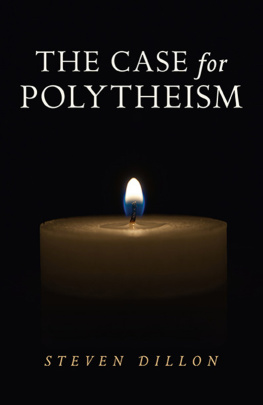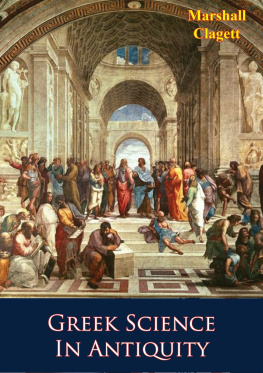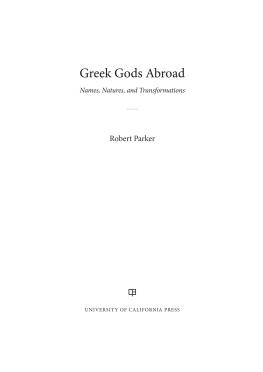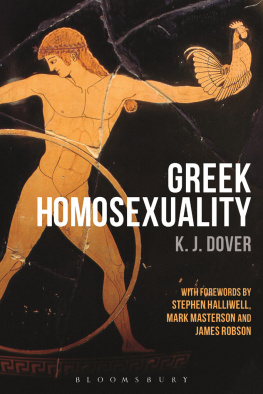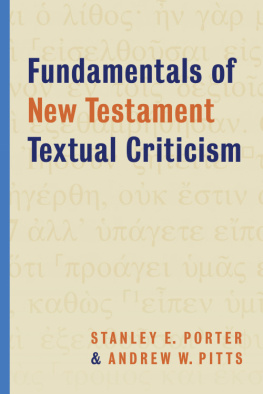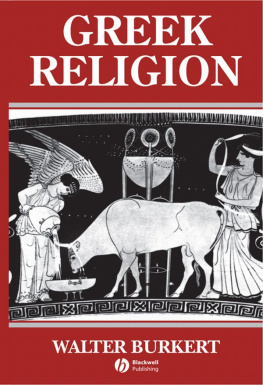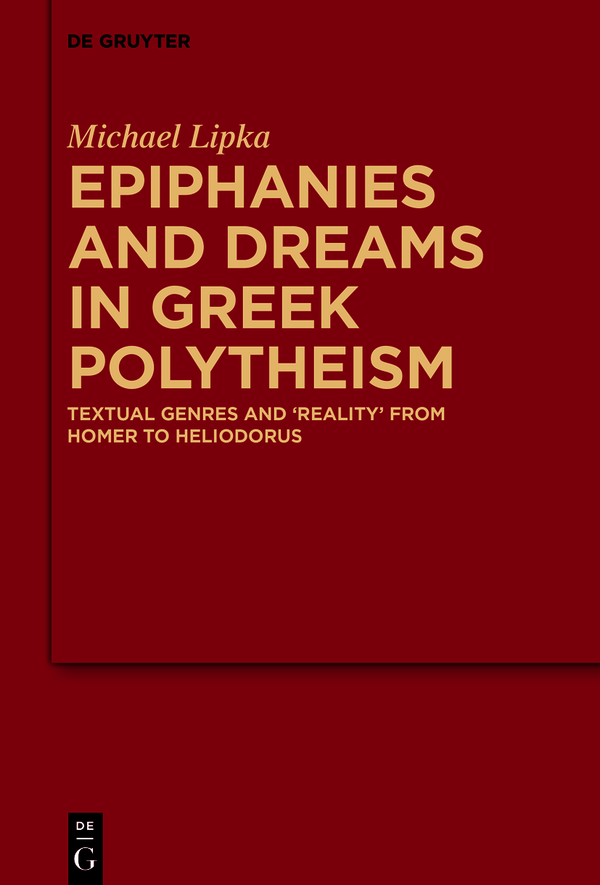MythosEikonPoiesis
Edited by
Anton Bierl
Volume
ISBN 9783110636369
e-ISBN (PDF) 9783110638851
e-ISBN (EPUB) 9783110639162
Bibliographic information published by the Deutsche Nationalbibliothek
The Deutsche Nationalbibliothek lists this publication in the Deutsche Nationalbibliografie; detailed bibliographic data are available on the Internet at http://dnb.dnb.de.
2022 Walter de Gruyter GmbH, Berlin/Boston
To the ASCSA and BSA,
most generous institutions of
serene scholarship,
and to their beautiful gardens.
Foreword and Acknowledgements
This book is the slowly ripening fruit of my fascination with the representation of communicating gods in ancient Greek polytheism. Over more than a decade, it has benefited from the generous advice of many scholars who have commented on different versions of individual chapters at different times: Lucia Athanassaki, Ewen Bowie, Frederick Brenk, John Dillon, Nanno Marinatos, Donald Mastronarde, John Mikalson, Robert Parker, Christopher Pelling, Spyridon Rangos, Antonios Rengakos, Jrg Rpke, and Bernd Seidensticker are those whom I still recall. I wholeheartedly thank them and others who contributed to the book for their time and their instructive criticism.
Two scholars in particular facilitated the publication of this book. Georgia Petridou, the (initially anonymous) reviewer, put at my disposal her profound expertise and even greater generosity in sponsoring an approach that responded critically to rather than continuing her own contributions to the field. Even more, I must thank Anton Bierl, editor of MEP, who stood by the book unreservedly, devoted much time to scholarly and editorial discussions, was always reliable, efficient, available and quick in his judicious responses, in a word, a .
As for the more technical aspects of the completed version of the book, Katharina Legutke, acquisitions editor of classical studies at DeGruyter, as well as Anne Hiller and Ulla Schmidt, both responsible for the production process, saw the text through the press in a professional, unbureaucratic, and always good-humored mood. In particular, Ulla Schmidt was extremely generous with her time and her acumen, in ensuring the swift and accurate realization of hundreds of corrections in the numerous proofs. Besides, Brian McNeil checked the English (and thereby also its contents). Brians astonishing efficiency in reading through large amounts of texts with incredible speed and still painstaking attention to detail is only matched by his even greater kindness of reading similar versions again and again. Still, in terms of patience no one could possibly match my wife, Elena, who for yet another decade bore my quirks and long absences in Athens with her characteristic stoic and caring resilience.
I have tried to include relevant bibliography until 2020, with a deliberate emphasis on more recent publications. But while I thereby try to be as uptodate and balanced as possible, I refrain from heaping up bibliography for the bibliographys sake. Given that the book covers a millennium of textual production in more than a dozen genres, no one will expect to find a full discussion of all relevant approaches that scholars in the past have taken to individual issues. Instead, I will give precedence to my own argument and respond primarily to those approaches which either reinforce or oppose it. Although I have tried hard to read and sift most relevant bibliography, I am aware that, inevitably, I will have missed some important contributions. Still, despite the truism that the bibliography is enormous, let it be said that omission does not automatically imply ignorance on my part. Relevance and focus remain debatable matters, especially when dealing with such an enormous bulk of textual material.
My translations are mostly adaptations from existing translations or new translations from scratch. Preferably, due to availability, I rely on the most recent Loeb translations. As for transcriptions of proper names, I prioritize lucidity over consistency. The same holds true of my abbreviations of ancient sources. Most of them are based on the 9th edition of Liddell & Scott (1940), while some follow the fourth edition of the Oxford Classical Dictionary (2012); others are my own. I generally adhere to Latin or English, when referring to work titles, but in the case of fragments, I normally offer a transcription of the Greek titles (without diacritics) because such a procedure facilitates identification better than translating the Greek title into Latin or English.
As for the numbering of fragments, in those cases in which I follow standard editions such as PCG and TrGF, I do not mark the source edition specifically. For reasons of convenience (although not systematically), I sometimes refer the reader to the Loeb translations of dramatic fragments. Here, the introduction to the relevant plays is often very useful to get a quick idea of the highly conjectural contexts or contents. Where I quote fragments according to less standardized collections, I mark the source by the surname of the editor, whose edition I use.
Like its three precursors, this book was written on the second floor of the Davis Wing of the American School of Classical Studies at Athens (= ASCSA), in the Byzantine Room of the British School at Athens (= BSA), and in the beautiful gardens that surround them. It is with profound and longoverdue gratitude that I dedicate it to these timeless havens of scholarly contemplation.
Introduction
It is a mark of the trained mind never to expect more precision in the treatment of any subject than the nature of that subject permits.
Arist. EN 1094b 2325
More than 30 years ago, H. S. Versnel posed the question: What did ancient man see when he saw a god? Versnel responded magisterially by drawing attention to the occasionboundedness of epiphanies and ways of seeing. Meanwhile, he remained indifferent to the occasionboundedness of the very sources on which he based his argument. Versnels seminal contribution thus reflects a scholarly trend which has not changed over the decades: while students of Greek and Roman religion are virtually always alert to the occasionboundedness of religious phenomena, they are curiously indifferent to the occasionboundedness or generic parameters of their sources. Generic questions are normally left to the literary critic or art historian respectively, who in turn is less interested in religious matters.
Nevertheless, it is the contention of this book that religious phenomena and genre must be viewed together. In fact, on methodological grounds, an inquiry into the occasionboundedness of the representations should precede the investigation of the occasionboundedness of the represented concepts, because the former determines the latter. This, combined with Heaths insight that there are no genreless texts, makes us modify Versnels question, and ask: What did ancient man see in reality when he was represented as seeing a god? Such a reformulation implies a focus on the generic boundaries of representations of seeing the gods as well as a focus on seeing in reality.
There is much more at stake here than a pedantic insistence on the truism that different sources represent religious reality differently. Rather, the task at hand is to detect representational patterns behind these differences and by doing so to open up the studies of Greek religion to the concept of fiction. For it seems to me that modern scholarship tacitly construes narrative fiction in opposition to religion: if Homers epiphanies are religious, so the argument runs, they cannot be understood as mere fiction. Such an approach goes along with the postulate of an epiphanymindedness of the Greeks, i.e. their willingness to consider epiphanic Homeric gods as constituent or at least normal elements of the human lifeworld. Prominent scholars in the field take such epiphanymindedness for granted. In the study just quoted, Versnel implies that ancient man thought he could see the gods. Graf argues: Epiphanies were real, and they were vital. Gods were irrelevant if they could not manifest themselves to humans such appearances were widespread, and were widely believed .


